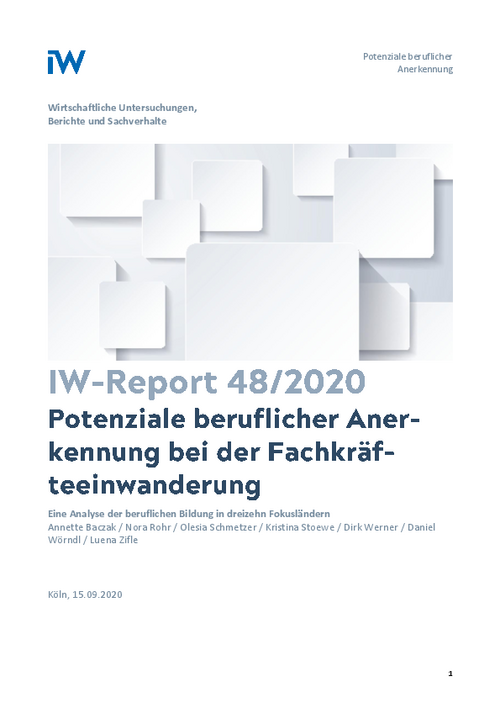Germany as a business location relies on international qualified professionals in the long term. Since March 2020, the Skilled Immigration Act has also made it possible for professionally qualified people from third countries to immigrate to Germany for the purpose of work. A requirement for this is that the foreign vocational qualification has been recognized in Germany.

Potential for Professional Recognition in the Immigration of Skilled Workers: An Analysis of Vocational Training in Thirteen Focus Countries
IW-Report

Germany as a business location relies on international qualified professionals in the long term. Since March 2020, the Skilled Immigration Act has also made it possible for professionally qualified people from third countries to immigrate to Germany for the purpose of work. A requirement for this is that the foreign vocational qualification has been recognized in Germany.
The report analyses vocational education and training in 13 focus countries from which potentially qualified professionals could immigrate. They are classified in four country clusters: "Latin America", "North Africa", "India and Southeast Asia" and "the Western Balkans". The focus countries cover a wide range of differently structured vocational training systems. They were selected because they can be assumed to have a significant potential for immigration of skilled workers.
In addition, the report highlights the special features of the recognition of variously regulated vocational qualifications from other countries, for example for school-based and practical training or for short and long training periods. The potential for recruiting qualified professionals from the relevant focus countries is derived from the analysis of foreign vocational training systems and vocational qualifications, considering the requirements of professional recognition in Germany. The focus here is on the recognition of vocational qualifications that fall within the scope of dual vocational training in Germany. The result are concrete insights into which types of vocational qualifications have a high potential for recognition and thus for immigration to Germany.
The country analysis makes it clear that although most of the examined countries show efforts to establish dual training elements, in many cases these are not yet widespread. For this reason, for the recruitment of qualified professionals it is also worth looking at other training formats that are organized differently and that are structurally similar to dual training. These include, for example, school-based training courses with a high proportion of practical elements and step-by-step training courses. However, there is also potential for the recognition of (dual) training occupations in Germany for some university-based qualifications from abroad.
The analysis of the 13 focus countries considered provides an initial orientation for the recruitment of qualified professionals from abroad, especially from third countries, and the recognition potential of various vocational qualifications.
Furthermore, the present report shows options for action for an even more efficient implementation of the recognition procedure from abroad: the increased use of digital formats, the expansion of immigration opportunities within the framework of the recognition procedure, the examination of financial support for applicants from abroad as well as a review of the existing resources of the responsible authorities.

Annette Baczak / Nora Rohr / Olesia Schmetzer / Kristina Stoewe / Dirk Werner / Daniel Wörndl / Luena Zifle: Potenziale beruflicher Anerkennung bei der Fachkräfteeinwanderung – Eine Analyse der beruflichen Bildung in dreizehn Fokusländern
IW-Report

More on the topic

Further training needs of the automotive industry in transformation
Due to the ecological and digital transformation, significant parts of the German economy, particularly the industrial sector, are currently undergoing a transformation. This development also extends to the automotive sector, which occupies a vital position in ...
IW
The Increasing Importance of Literacy Courses and Further Training for the Low-skilled
Digitalisation and the demographic transition are presenting companies with ever new challenges. This puts pressure on firms to be in a process of constant change, a phenomenon reflected in the growing demands they put on their low-skilled employees.
IW